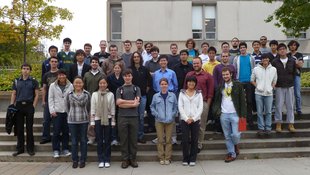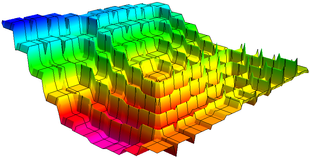10-327/Classnotes for Thursday October 14: Difference between revisions
No edit summary |
|||
| (6 intermediate revisions by 4 users not shown) | |||
| Line 4: | Line 4: | ||
{{Template:10-327:Dror/Students Divider}} |
{{Template:10-327:Dror/Students Divider}} |
||
Here are some lecture notes.. |
|||
[http://katlas.math.toronto.edu/drorbn/images/5/51/10-327-lec09p01.jpg Lecture 9 page 1] |
|||
[http://katlas.math.toronto.edu/drorbn/images/7/76/10-327-lec09p02.jpg Lecture 9 page 2] |
|||
[http://katlas.math.toronto.edu/drorbn/images/e/e3/10-327-lec09p03.jpg Lecture 9 page 3] |
|||
[http://katlas.math.toronto.edu/drorbn/images/9/95/10-327-lec09p04.jpg Lecture 9 page 4] |
|||
[http://katlas.math.toronto.edu/drorbn/images/8/84/10-327-lec09p05.jpg Lecture 9 page 5] |
|||
[http://katlas.math.toronto.edu/drorbn/images/9/97/10-327-lec09p06.jpg Lecture 9 page 6] |
|||
==Riddles== |
|||
===The Dice Game=== |
|||
Two players A and B decide to play a game. |
|||
Player A takes 3 blank dice and labels them with the numbers 1-18. |
|||
Player B then picks one of the three die. |
|||
Then Player A picks one of the remaining two die. |
|||
The players then roll their dice, and the highest number wins the round. |
|||
They play 10,023 rounds. |
|||
Who would you rather be Player A or B? |
|||
===Almost Disjoint Subsets=== |
|||
Find an uncountable collection of subsets of <math>\mathbb{N}</math> such that any two subsets only contain a finite number of points in their intersection. Don't cheat by using the axiom of choice! |
|||
[[10-327/Solution to Almost Disjoint Subsets]] |
|||
*I wasn't there for this riddle but it sounded interesting, though I might have the phrasing wrong - John. |
|||
* Feel free to cheat and use the axiom of choice - I don't see how it would help anyway. [[User:Drorbn|Drorbn]] 17:40, 18 October 2010 (EDT) |
|||
=== Solutions === |
|||
4 Solutions to problems in Munkre's book regard to Metrics and Metric topology. -Kai [[User:Xwbdsb|Xwbdsb]] 16:47, 28 October 2010 (EDT) |
|||
[http://katlas.math.toronto.edu/drorbn/images/e/ef/10-327metric_exercise1.jpg page1] |
|||
[http://katlas.math.toronto.edu/drorbn/images/c/c0/10-327metric_exercise2.jpg page2] |
|||
[http://katlas.math.toronto.edu/drorbn/images/8/82/10-327metric_exercise3.jpg page3] |
|||
[http://katlas.math.toronto.edu/drorbn/images/e/ec/10-327metric_exercise4.jpg page4] |
|||
[http://katlas.math.toronto.edu/drorbn/images/8/8e/10-327metric_exercise5.jpg page5] |
|||
Latest revision as of 19:43, 28 October 2010
| ||||||||||||||||||||||||||||||||||||||||||||||||||||||||||||
See some blackboard shots at BBS/10_327-101014-142707.jpg.
| Dror's notes above / Student's notes below |
Here are some lecture notes..
Riddles
The Dice Game
Two players A and B decide to play a game. Player A takes 3 blank dice and labels them with the numbers 1-18. Player B then picks one of the three die. Then Player A picks one of the remaining two die. The players then roll their dice, and the highest number wins the round. They play 10,023 rounds. Who would you rather be Player A or B?
Almost Disjoint Subsets
Find an uncountable collection of subsets of [math]\displaystyle{ \mathbb{N} }[/math] such that any two subsets only contain a finite number of points in their intersection. Don't cheat by using the axiom of choice!
10-327/Solution to Almost Disjoint Subsets
- I wasn't there for this riddle but it sounded interesting, though I might have the phrasing wrong - John.
- Feel free to cheat and use the axiom of choice - I don't see how it would help anyway. Drorbn 17:40, 18 October 2010 (EDT)
Solutions
4 Solutions to problems in Munkre's book regard to Metrics and Metric topology. -Kai Xwbdsb 16:47, 28 October 2010 (EDT)

